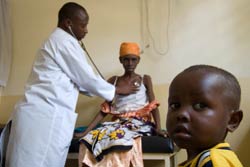NIH partners with PEPFAR to strengthen medical education in Africa
March / April 2010 | Volume 9, Issue 2

Photo by David Snyder, courtesy of Photoshare
NIH has announced a new initiative to
strengthen medical education in sub-
Saharan Africa, in collaboration with the
President's Emergency Plan for AIDS Relief,
known as PEPFAR.
The NIH has announced a new initiative to strengthen medical education in sub-Saharan Africa, in collaboration with the President’s Emergency Plan for AIDS Relief, known as PEPFAR. This program supports PEPFAR's goal to increase the number of new health care workers by 140,000. It will also strengthen host-country medical education systems and enhance clinical and research capacity in Africa.
The Medical Education Partnership Initiative (MEPI) will award African institutions with as many as nine grants focused on PEPFAR priority areas. In addition, six linked awards will support work in noncommunicable diseases and priority health areas related to and beyond HIV/AIDS. The program will also support one coordinating center.
"As we transition from an emergency response to a more sustainable approach, we are supporting partner countries in leading the response to their epidemics," said Ambassador Eric Goosby, U.S. Global AIDS Coordinator. "Shortages of trained doctors are a key constraint, and we are proud to support partner nations in expanding the number and quality of clinicians available and facilitate strong faculties of medicine so they can meet their people’s needs over the long term."
This program is a joint effort of the Office of the U.S. Global AIDS Coordinator, the Health Resources and Services Administration, the Centers for Disease Control and Prevention, the DoD and 19 NIH components. The awards will be administered by Fogarty and HRSA.
"As new scientific discoveries are made about both infectious and non-communicable diseases, it is vital that we develop research capacity in sub-Saharan Africa so that advances can be quickly adapted for local use," said NIH Director Dr. Francis Collins, who committed support from the NIH Common Fund. "This program will not only strengthen medical education to produce much needed caregivers but will also generate well-trained researchers who are able to apply a multidisciplinary and implementation focused approach to locally relevant scientific questions."
The application deadline is May 12, 2010. Awards are expected by the end of September.
More Information
To view Adobe PDF files,
download current, free accessible plug-ins from Adobe's website.